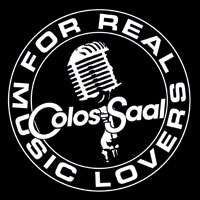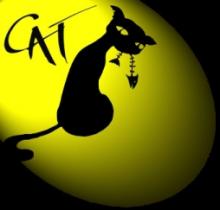"Wanderlust" ist nun schon das zweite Album, das die Proggies LITTLE ATLAS aus Miami über das Progrockrecords - Label veröffentlichen.
Band:
BiografieIf history, as my 11th grade history teacher taught us, is written by the victors, then certainly a BAND’s history is written by the member that survives the longest. That would be me, then. I have been meaning to write a sort of definitive history of Little Atlas, partly to give a little perspective to the majority of our listeners who are unaware of a time before “Surface Serene” and our signing with Progrock Records and partly for my own selfish reasons to really UNDERSTAND where we have been and to hopefully know where we are going. Little Atlas
I write this history without the benefit of much time and distance from certain events. Therefore, it will be flawed and incomplete, affording accolades to the unworthy and damnation to the innocent. Such is life. If I botch a detail or three, I stand ready with my handy HTML editor to erase any pretense of a “fixed” view of where we have come from.
Little Atlas was born from the ashes of Waxing Poetic, a band formed shortly after I moved back to Miami in 1994. Waxing Poetic featured 4 performers who would eventually become Little Atlas: David McKean on bass, Dan Katsikas (my brother) on drums, Joanna, my wife on backing vocals, and myself. Flushing out the sextet were Kim Houghton, a long-time friend to my both my brothers and myself, on keyboards and backing vocals and Jamie Israel on lead guitar. Waxing Poetic barely lasted long enough to make a demo, play a few shows, and rapidly implode. The music we produced was joyful and quixotic. We wrote some interesting material, but the interpersonal and musical styles of the members was like one of those recipes whose ingredients all sound wonderful, but whose combination produced something that makes one not reach for a second helping. Jamie, a UM jazz guitar major was the first to bolt. I liked Jamie as a person. He was enigmatic as a lead guitarist: a jazz performance major with horrible stage fright His riffing was often at the very limits of my understanding of music theory. Jamie announced one day he was leaving the band. I think he said he was leaving school too. I have searched for him every few years on the internet and never found him again. Kim was chronically frustrated with my dictatorial band leadership style. I can be a pain in the ass to work with. I wasn’t surprised when she indicated that she wasn’t interested in sticking around to look for another guitarist. Waxing Poetic waned and set, never quite the bright star we all hoped it would be.
I swore off bands.
Again.
I delved into more acoustic renditions of my material, dragging Joanna, my living harmony machine, with me to every open mic night in Miami. Life was good and I started writing again.
I wanted to record some of the new material, so I called my ever-ready brother, Dan, and ex-bassist Dave over to help me flush out some tunes. The material worked well and we found that the 3 of us really enjoyed playing together again. I don’t remember if it was Dave or myself who suggested putting another band together by looking for a lead guitarist. Regardless, it began one of the many searches for musicians. Any musician can tell you that the process of looking for a good-fitting musician through a series of auditions is one of the oddest processes in human interpersonal relations ever created. The only thing worse than the series of let’s-jam-to-something-we-all-know from the band’s point of view, is being on the other end and auditioning for an intact unit looking for someone who doesn’t really exist. I don’t recall how many folks we auditioned, but when Dave suggested we give an old ex-bandmate of his a call, I think we were at the end of trying.
Dave called Aaron Whitman, who said, in virtually the same breath, that he had sold all his gear but would like to audition. Ok, we thought. Aaron apparently went to Guitar Center, bought a Les Paul, floor effects pedal, and Marshall Cab, and showed up the next day to dumbfound us with his guitar skills. Melodic, understated, and bluesy in his approach, Aaron was far and away the best guitarist we had auditioned. Joanna was still up for music-making, and a new band was formed.
But what to call it….?
Flashback to around 1992. I had written a song called “Little Atlas”. The song was inspired by a real kid who I had the pleasure of working with as a therapist. He was one of the most worried children I had ever met. Everything was his fault. It was his fault that his parents fought. It was his fault that his sister couldn’t keep up in school, it was his fault that his father beat him so hard that Children’s Services had to intervene. Yet, he possessed an inner strength that allowed him to eventually see that he did not have to carry the proverbial weight of the world on his shoulders. It was this beautiful dialectic contained within frailty and the strength to overcome adversity that inspired me to pen the lyrics to the song. The song, Little Atlas, has the dubious distinction of being performed by virtually every band I have ever played in. It isn’t played any longer.
Flashforward…
“Let’s call the band Little Atlas” someone said. Maybe me, maybe Dave. I don’t know why I get my ideas and Dave’s confused in the band history. Probably because we were the most “into it”. Endless conversations about approaches to writing, goals for the band, etc…Maybe because Dave and my family have a history with a lot of intertwining. A lot. Anyway, the name seemed perfect. Overcoming adversity. Check. Frailty and lack of self confidence. Check. Us versus the world. Well, we all carried a rebellious streak in us, so CHECK. I don’t think there was much arguing about the band name. We were all in agreement. The arguing would come later. It was 1997.
“We got a gig!” Months of rehearsal was finally going to pay off. A bar called Cheers was going to give us a shot. We showed up, invited all our friends, and played our hearts out until the PA blew up. Seriously, smoke rose from the dead innards of what used to be a device that amplified power. The band set to follow us was not happy. A week later, Cheers closed. We had killed our first venue. Many gigs and slayed venues followed in our footsteps. Rose’s: dead. The South Beach Pub: dead. Brandt’s Break: dead. Yet we played on, finally retreating to our humble studio to record Neverworldly, our first CD. With a computer, an analog 8-track cassette machine, and some low budget gear we put together an album that was cohesive and honest. The guy-girl vocals and decidedly folky nature of the songs we were writing then, plus the fact that I played exclusively acoustic guitar led to (not entirely unwelcome) comparisons to Jefferson Airplane. We recorded, mixed, and mastered the CD over about 6 months and had our CD release party at Miami’s BEST live music venue, Power Studios. They never should have booked us. Within a few months….yep, you guessed it….Power Studios was dead. Buried in the Little Atlas graveyard of broken dreams and unrealized liquor licenses. The album sold well and we received a nice write-up in the Miami Herald. We had emerged from our early childhood into latency age. Freud described latency age as the time when “not much happens” psychologically. Yup.
“I am going to get an MBA” Dave announced to us. This time I am sure it was Dave. Great. “In Gainesville”. Ummm. Great? Only 1 weekend a month. Oh, ok. But the demands of higher education were a lot more than the one weekend a month that Dave had pitched us. It was more than the academic equivalent of the National Guard. His projects sucked his free time like an intellect-leech. After a successful CD release and a quick selling of 200 cds, we only played 3 shows in the whole year following. The frustration of not gigging was only part of the problem. Musically, we were all going in different directions. This was likely prompted by my decision to leave the acoustic guitar on its stand and focus on writing from the keyboard, an instrument that I was more skilled at playing. Our sound changed. Drastically. Dave and I were pretty much at the same point when one of us decided he should leave. Again, I don’t recall who brought it up, but this was a mutual decision. His affair with business models, cost accounting, and entrepreneurship was much more exciting than the lackluster marriage that constituted Little Atlas at that time. Soon after Dave left, my brother Dan, a new parent and recent buyer of a house 40 miles away told me he couldn’t do it any longer either. I still wanted to keep going, as did Aaron. We quickly found Scott Fansler, one of the most gifted bassists I had ever met. Scott introduced me to a genre of music called “prog”. As a longtime fan of 70s art rock, I had no idea that bands like Spock’s Beard, Echolyn, Kevin Gilbert, and Izz existed. I had no idea people had taken the adventurous spirit of those times and were building upon that. I was mesmerized. I wanted to play that kind of music. Now, all we needed was a new drummer.
Since my move to Miami, I had always maintained the benefit of having a brother who was an excellent drummer. I never really got all those drummer jokes, though I laughed just the same. Until…we had to start auditioning them. I won’t get into specifics, but it took a good 5 months before Tom Vazquez called me, days before my first son was born, to say he was a huge fan of progressive rock and was interested in drumming. After we brought our son home and things settled down, Tom came over and nailed 3 songs of ours he had heard on the internet, note for note. He was in.
The band had survived its first brush with annihilation.
With Tom on Drums, Scott on Bass, Aaron on Guitar, Joanna on backing vocals, and myself, Little Atlas settled into a period of unparalleled productivity. Songs were coming together at a record pace. We were getting along great. We were all becoming close as musicians and as friends. We gigged often and gained confidence and poise. When we had amassed a bunch of material, we started talking about recording the new album. We started recording drums and bass tracks. It was then, that Scott let us know that he would be moving to Denver. Scott’s departure was as hard on him as it was on us. Scott is an Air Traffic Controller. He was a walking, riffing example of virtually every cliché one can imagine about air traffic controllers. His job was slowly killing him, or at the very least sucking his spirit dry. Occasionally, he could be observed in rehearsal unable to let go of the stress of his job. When he dropped the bomb on us, we understood. Nonetheless, his follower, if there would be one, would have big boots to fill. Regardless, we had drum and bass tracks towards the new album and figured we could immerse ourselves in the studio while looking for another bassist. That plan blew up however, when Aaron, unhappy with the new songs, the lack of big gigs, and a growing resentment towards my approach to running a band, decided to leave Little Atlas to play with a southern-infused pop/rock outfit fronted by an ex-bandmate of his. When Aaron recruited Tom to come join him on the new project, Tom simply looked at the sinking ship that was Little Atlas, and decided to take the last lifeboat to safety.
I was alone.
I swore off bands.
Again.
Well, I wasn’t really alone. I have neglected in this tale to tell you of the faithful Joanna: Light of my life, mother to my children, soul mate and confidant, and the longest-lasting member of Little Atlas besides myself. Joanna is the reason I can do music. Her unwavering support of my passion for creating music is difficult to explain. I have come to understand that it is not merely that she loves me, but also that she deeply understands who I am and what I need to remain balanced and spiritually complete. Shortly after I received Tom’s call, she softly told me that I would persevere, that I would find a way to continue to make music. Her quiet confidence bolstered me, though I remained ambivalent. I started answering classified ads looking for keyboardists. Apparently, every band in 2001 wanted to be “Creed”. Little Atlas was nothing but a rapidly fading memory and some drum and bass tracks on a computer.
Then the phone rang.
Speaking in a rich Venezuelan accent, Rik Bigai asked if we had found a bassist yet. He had seen our ad in the Miami New Times at precisely the moment he had decided to look for a progressive rock band. In the chaos of the disintegration, I had actually forgotten that we had even placed a newspaper ad looking for a bassist. I spoke to him briefly, unsure of whether there was a band, and informing him that there was hardly a “we”. He was unfazed and indicated he thought we could put something together. I was impressed with his motivation and enthusiasm, but unsure whether I could take the pain of more auditions and the challenge of finding folks who wanted to play Little Atlas music. We left it up in the air, until a few days later, Tom and I decided to meet and talk about music. Tom told me he had made “a mistake” going over to another band, and that his heart was really in Little Atlas. It was an odd reconciliation, but I was happy to have Tom back. We quickly decided to audition Rik, who came in and nailed all the songs he had downloaded from the internet. Rik’s bass-playing fit Little Atlas like a well-worn glove. The core of Little Atlas had re-ignited, though radiation sickness is often a slow and sublime process.
After a series of painful auditions, we finally hooked up with Roy Strattman, hands-down the most innovative guitarist I had ever played with. Roy was a perfect match for Little Atlas, both laid-back in his personality, and intensely adventurous in his playing.
Little Atlas was once again rescued from the edge of extinction.
The band rehearsed with enthusiasm. We gigged with unbridled passion. All was well in the music department. Everyone seemed happy. We decided to get back to the recording process and started re-recording tracks for the album that would become “Surface Serene”. Drum tracks were followed by bass tracks were followed by vocals and keys and guitar. Every recording session saw a little more life being breathed into the songs. The excitement was palpable.
Then Tom quit the band…again.
One of the first lessons I learned in graduate school for psychology was that the best predictor of future behavior was past behavior, so I, least of all, should have been surprised at Tom’s second departure. However, it blindsided us. With many gigs booked, an album almost finished, it seemed inconceivable that anyone in the band would consider leaving. I could elaborate on Tom’s reasons for departure, but it will do no good to air laundry on the internet, where everything that is written can potentially live forever. I can only say that my initial anger and disappointment quickly subsided. After all, as this tale suggests, the game of “musical chairs” was a core part of the evolution of the band. There is some debate among Little Atlas historians about how many times Tom quit and rejoined the band. I seem to remember it occurring only twice, but others have said it occurred three times. Regardless, Tom’s relationship to Little Atlas was akin to a bad marriage destined to implode. Ultimately, Tom went on to rejoin Aaron’s southern-rock infused band, and, as far as anyone knows, is still playing with them.
What to do?
With several gigs booked, we furiously auditioned more drummers. It took us precisely a week to find our next drummer, Diego Pocovi. Diego had a long history with bassist Ricardo going back to their time together in Venezuela. Diego had played with Radio Clip, an extremely successful band in Venezuela. I have seen video of their concerts, and it is the stuff of rock and roll dreams: Huge arenas, thousands of cheering fans singing along to their songs, and a half-naked Diego Pocovi, hammering (and hamming) out a drum solo and actually having fans go nuts. Despite some rusty chops, Diego immediately impressed us in his audition. He learned an entire set in 2 weeks and covered all of our outstanding gigs. We hardly missed a beat (pun intended). Additionally, he laid down all the percussion tracks and a new drum track for the album, Surface Serene.
Little Atlas had achieved its current lineup.
We dove back into the final touches on the album. I uploaded a track to an internet group called Mixmasters. It is a listserv comprised of recording musicians. We often upload and critique tracks for each other. I received an email from one of the listmates, who asked permission to pass the track to a friend of his, Shawn Gordon, who was starting a progressive rock record label. Ultimately, Shawn and I conversed and discussed the album, and in record time Little Atlas signed a record deal with ProgRock Records. In April, 2003, we released Surface Serene.
This brings us to the end of our tale, which is akin to a finish line we never seem to cross, despite how quickly we may run. It is a story filled with both highs and lows, fraught with perils and redeemed by resilience. Little Atlas continues to be an evolving entity. As we begin work on our new studio album, we are writing together as an ensemble, we are scheduled to perform at an international progressive rock festival in Philly (www.rosfest.com), and we are manufacturing our second batch of 1000 cds of “Surface Serene”. We are older, wiser, happier, and, dare I say, more adventurous. We have come a long way as individuals and as a band. I often feel like the child raised by an entire village comprised of every musician with whom I have ever played. It makes for an odd lineage. The future always holds surprises, but my hope is that I understand the past enough to realize where I have been.
Steve Katsikas
March 2004
Quelle: http://www.littleatlas.com/new/history.aspDiscografie1998 - Neverworldly
2003 - Surface Serene
2005 - Wanderlust
www





